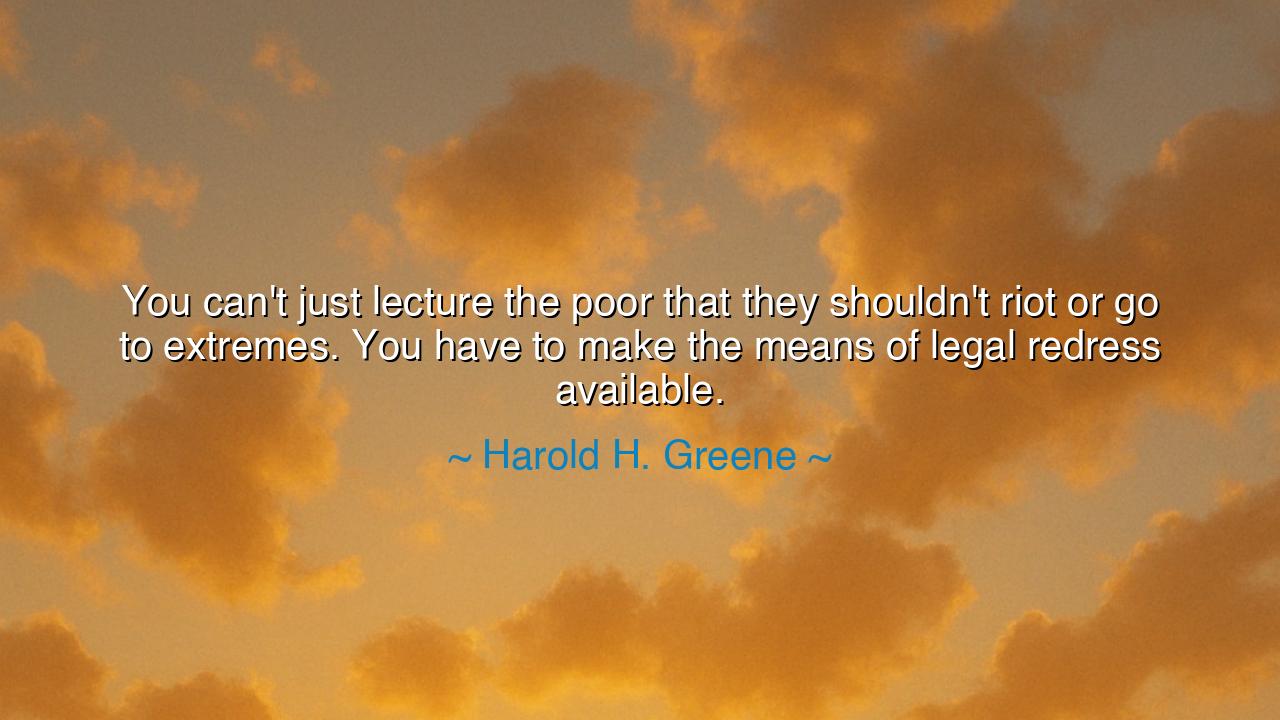
You can't just lecture the poor that they shouldn't riot or go to
You can't just lecture the poor that they shouldn't riot or go to extremes. You have to make the means of legal redress available.






Hear the words of Harold H. Greene, a judge who lived through the great struggles of justice in America, who declared: “You can’t just lecture the poor that they shouldn’t riot or go to extremes. You have to make the means of legal redress available.” In this saying lies a truth as old as civilization itself—that order without justice is tyranny, and peace without fairness is but a fragile illusion. For the oppressed will not stay silent forever; if they are denied the path of law, they will take the path of fire.
The origin of this saying lies in Greene’s long career as a federal judge, where he presided over cases of civil rights and reform. He understood that unrest is not born from the hearts of the poor without cause, but from years of denial, exclusion, and silence. To merely command the oppressed to be peaceful, while offering them no doors of justice, is hypocrisy. His words carry the wisdom of one who knew the law not as theory, but as a lifeline for those who would otherwise be voiceless.
History is filled with examples that bring weight to Greene’s words. Recall the French Revolution: the nobility scolded the starving masses to be patient, to endure without anger. But when bread was denied, and when no court would hear their cry, the people stormed the Bastille. The riot was not born from wickedness, but from despair, for the means of legal redress had been stripped away. Had justice been accessible, the flood of blood might have been stayed.
Or consider the Civil Rights Movement in the United States. For generations, Black citizens were told to remain peaceful while denied the ballot, the courtroom, and the protection of law. Many did remain peaceful, yet others, pushed to desperation, erupted in the fires of the 1960s. When the Voting Rights Act was finally passed, when the courts began at last to recognize the dignity of the oppressed, a channel was opened where before there had been none. It was proof of Greene’s wisdom: that peace comes not through lectures, but through justice made real.
The meaning of Greene’s teaching is clear: authority must not only restrain the hand of the oppressed, but also open the doors of justice to them. If a society commands obedience but denies fairness, it sows the seeds of its own destruction. For no amount of policing, no number of lectures, can calm a heart that has been silenced too long. Only the assurance that one’s grievances may be heard and answered within the halls of law can prevent the flames of rebellion.
The lesson, O listener, is for all generations. Do not scorn the anger of the poor, nor dismiss their desperation as lawlessness. Instead, ask what channels of justice have been denied them. Ask whether the courts are open to them, whether the laws protect them, whether they are heard by those in power. For when the cry of the poor is answered with access, fairness, and dignity, the riot is stilled not by force, but by hope.
And what shall we do in our own lives? Support systems that give voice to the voiceless. Demand leaders who make justice accessible not only to the wealthy, but to the weak. In workplaces, in schools, in communities, ensure that grievances can be raised and answered fairly, before they erupt in bitterness. Teach children that peace is not silence, but the fruit of justice.
So remember the wisdom of Harold H. Greene: you cannot preach peace to the poor while barring the courts against them. To prevent riot, to prevent extremes, you must grant the people a path to legal redress. For only when justice is available to all will peace endure, not as a fragile truce, but as the lasting covenant of a society truly built upon fairness.






AAdministratorAdministrator
Welcome, honored guests. Please leave a comment, we will respond soon